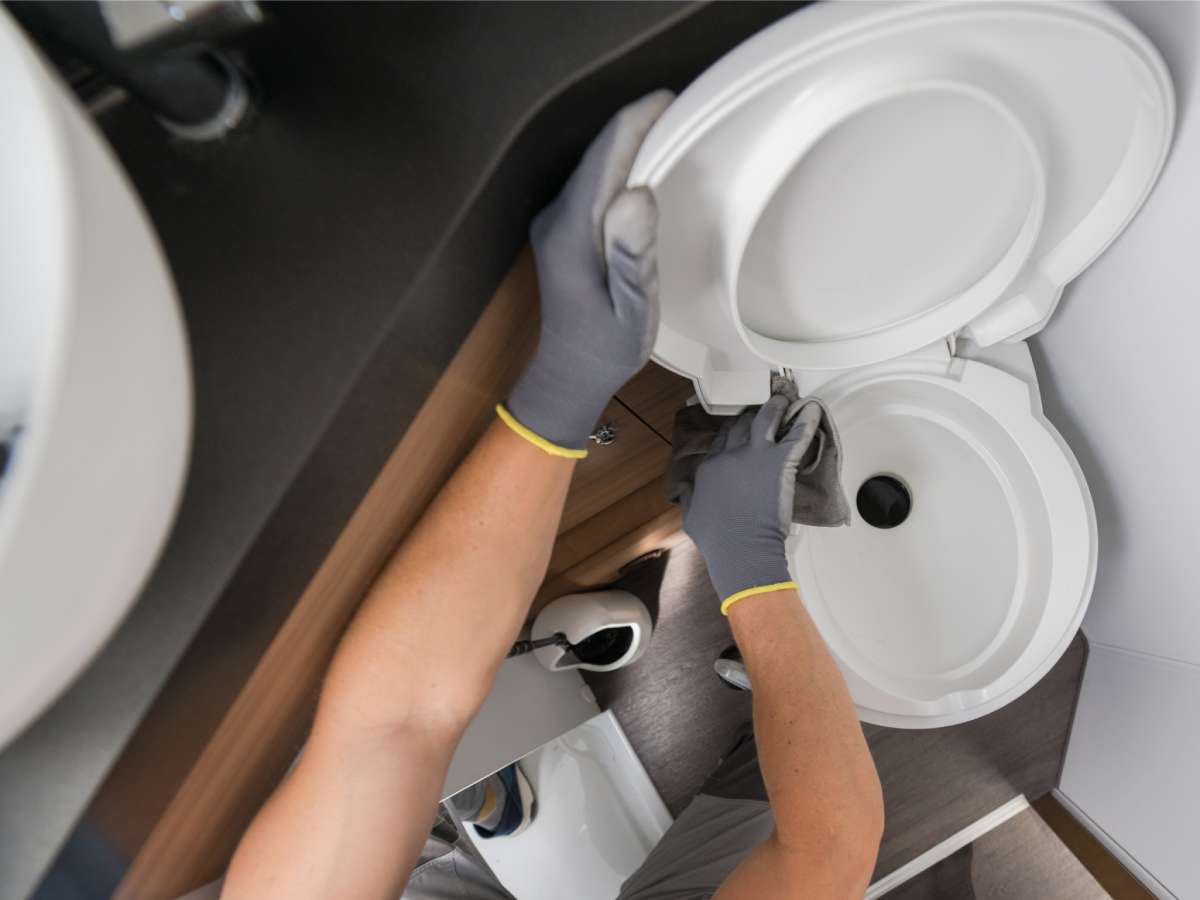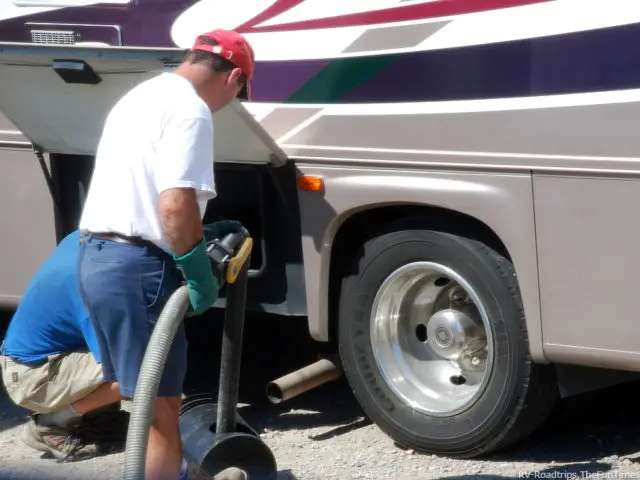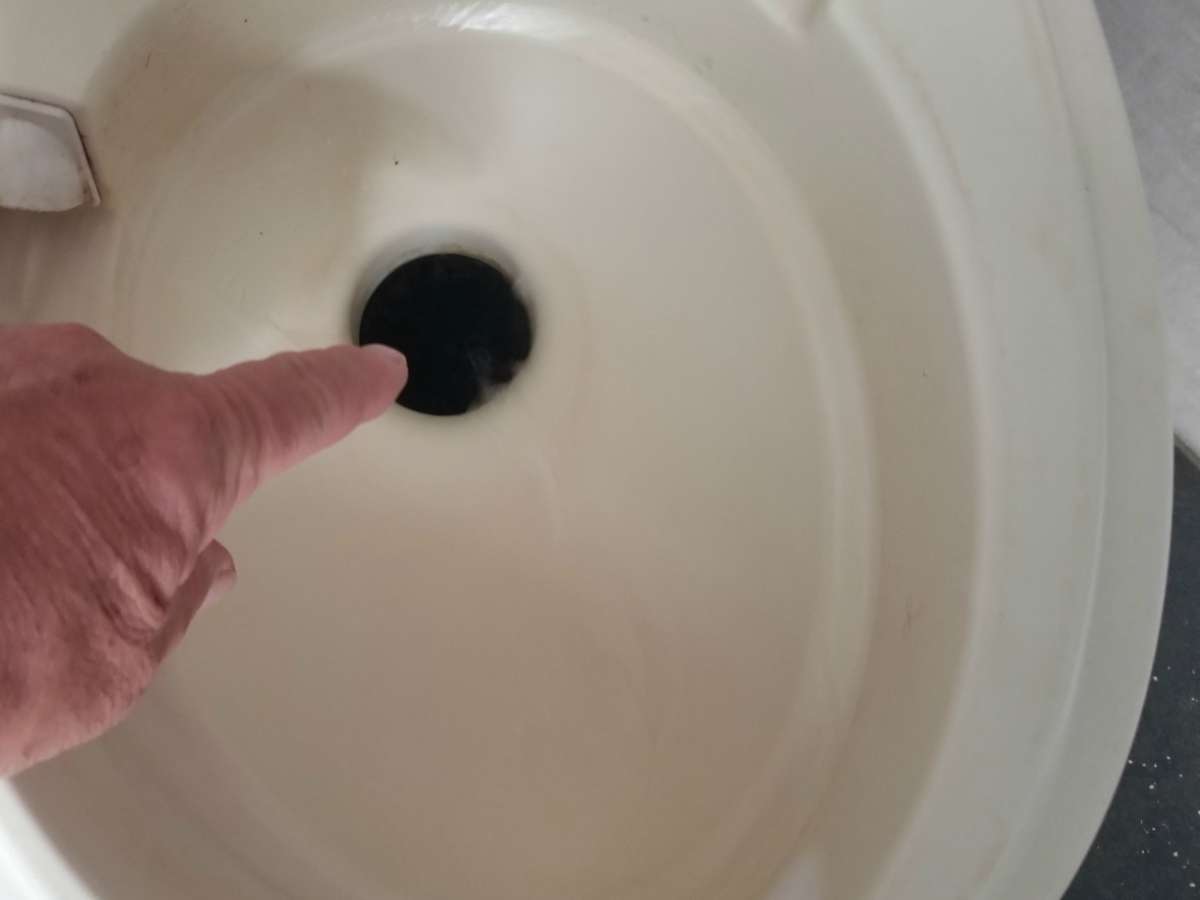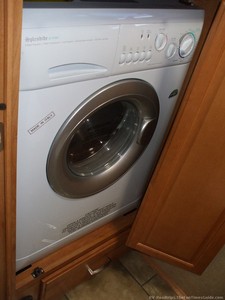 A weekend RV outing may result in a hamper full of laundry when you get home.
A weekend RV outing may result in a hamper full of laundry when you get home.
So what will you do if you’re planning on being gone for 2 months… or longer?
As an RVer, doing your laundry on the road can be a real pain.
At least that’s how it felt for my wife and I, when we were full time RVing!
Devoting our free time to sitting at a laundromat wasn’t a whole lot of fun.
Here are your options when it comes to doing laundry on the road as an RVer…
Alternatives To Doing RV Laundry Onboard
Public laundromats are the most popular option. You can find them in the Yellow Pages. However, if you’re traveling through a strange town, it can be hit and miss before you find one that is clean where you’ll feel safe after dark.
Many truck stops have laundry facilities — since truckers have less access to such things than the general public. This listing of truck stops by state shows what services are available.
Many RV parks and campgrounds have laundry facilities for their visitors, so you’re likely to be able to wash and dry your clothes right on site.
Once you do locate a place to take care of the time-consuming chore, the next issues are:
- How long will you have to wait for the next available washer or dryer?
- Do you have enough pocket change to finish all your laundry?
This is all easily manageable if you only have a need to clean your clothes 1 or 2 times a year when you take that rare, long RV trip.
On the other hand, imagine life on the road permanently as a full-time RVer. In that case, you’re going to get mighty tired of chasing down laundry facilities at least once a week!
Plus, there’s the issue of quantity. If you wait for every stitch of clothing to become soiled before you do the laundry, then finding a place to store your dirty laundry can be a pain as well.
The perfect answer to this whole issue of when and where to do your RV laundry on the road is an onboard RV washer & dryer.
2 Different Types Of RV Washer & Dryer Units
Most current RVs that are aimed at the world of full-time RVing come equipped with at least one large closet that is plumbed with the necessary fittings for such an appliance.
Some RVs come with the washer & dryer already installed from the factory.
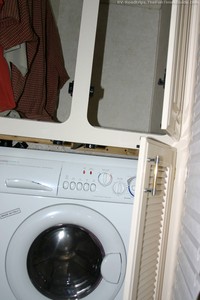 #1 With an RV washer & dryer combo unit onboard, you can put large loads of laundry into the front-loading door and your clothes will be washed, and then the machine will automatically switch to the drying cycle when it’s time. Once the load is completely dry and ready to be put away, a buzzer sounds. With today’s wash & wear fabrics, most clothes can be hung up right away.
#1 With an RV washer & dryer combo unit onboard, you can put large loads of laundry into the front-loading door and your clothes will be washed, and then the machine will automatically switch to the drying cycle when it’s time. Once the load is completely dry and ready to be put away, a buzzer sounds. With today’s wash & wear fabrics, most clothes can be hung up right away.
As great an improvement as a combo RV washer dryer unit is over searching for laundry facilities every couple days, there are still a few issues to address:
- Doing laundry will empty your RV water tank quicker than anything else you do onboard your RV. (If you’re boondocking in the desert, you’ll have an even harder time justifying that amount of water consumption!)
- You will be surprised how many clothes can be put into a 15-pound RV washer dryer. However, overstuffing the machine will simply mean the clothes won’t get clean and they won’t dry completely either.
- With the issue of time, washing and drying your clothes will take a lot of time to get the job done from start to finish. That one load will take about 3 hours to finish up completely! It’s a long drawn out process to complete one load of laundry in an RV washer dryer combo unit.
Here are some tips & tricks for using RV washer dryer combos.
The one-piece combo washer/dryer (pictured above) is the standard of the industry. You load the clothes, and after it washes them it proceeds to dry them. Because of its compact size, this is typically what you get when your RV comes from the factory with a combination washer/dryer.
Pros
- Compact, easy to use, and relatively conservative in terms of water usage.
- Once you start the load, you can forget about it until everything is washed and dried.
- Many RVs come plumbed and ready for you to slide a combo washer/dryer in, and you’re all set to go.
Cons
- Capacity is small and if you overload it, your clothes won’t wash very well.
- Drying time is extensive (3 hours to wash and dry 1 load is normal). Overload it and drying time will be even longer.
There is one other option worth considering…
#2 On our last full-time experience, rather than install this small RV washer dryer combo unit, we opted for a stacked apartment-sized washer with a separate dryer.
Ours was actually cheaper than the designated RV washer & dryer. (Anything labeled RV will be more expensive.) The washer and dryer we bought handled 12-pound loads and could be drying one load at the same time that it was washing the next. It was so nice to be able to wash all our dirty laundry without leaving the RV. It was just as easy as doing laundry in our own home!
If we get another opportunity to go full time RVing, we will be in a bunk house model 5th wheel RV. I will convert the bunk room area into a laundry room with additional closet space and possibly a kitchen pantry. Usually, the bathroom is right alongside the bunk room, so plumbing in a stacked RV washer & dryer
should be quite simple.
Stacked washer & dryer units are much less common, though in my mind a preferable option. Designed for apartment use, if you can fit a stacked washer & dryer into your RV, it will serve you much better than a combo unit will.
Pros
- Much larger capacity. (You can wash a load similar to what you do at home.)
- You can be washing one load while you’re drying another load. This cuts your laundry time in half.
- Because the dryer doesn’t have to evaporate leftover moisture from washing, the drying cycle is comparable to what you have at home.
Cons
- Because they’re not the industry standard, many RVs can’t accommodate their size. You may have to do some serious alterations to your RV if you want to go this route.
- Water conservation isn’t a strong point. You will need to be hooked to a water and sewer source.

